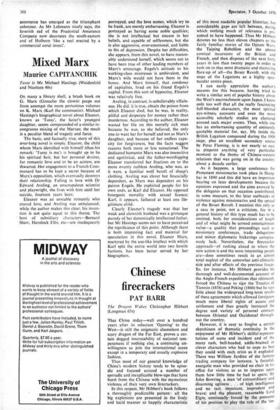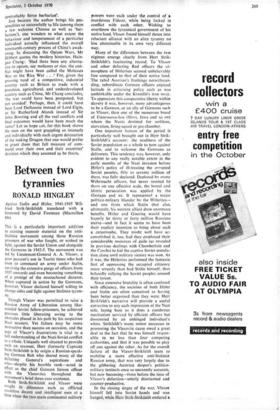Chinese firecrackers
PAT BARR
The Dragon Wakes Christopher Hibbert (Longman 65s) That China today—well over a hundred years after its reluctant 'Opening' to the West—is still the enigmatic chameleon and scary dragon of the Far East, proves a cer- tain dogged inscrutability of national tem- perament if nothing else, a continuing un- willingness to join the international scene except in a temporary and usually explosive fashion.
Thus most of our general knowledge of China's modern history tends to be episo- dic and focused around a number of sporadic and inexplicable blow-ups that have burst from the Chinese with the mysterious violence of their very own firecrackers.
In this respect, Mr Hibbert's book follows a thoroughly predictable pattern: all the big explosions are presented in the lively and lucid manner so happily characteristic
of this most readable popular historian, but considerable gaps are left between, during which nothing much of relevance is pre- sumed to have happened. Thus Mr Hibbert devotes no less than eleven chapters to the
fairly familiar stories of the Opium Wars,
the Taiping Rebellion and the almost comical incursions of the British and French, and then disposes of the next forty years in less than twenty pages in order to rush on to that most dramatic and shattering
flare-up of all—the Boxer Revolt, with the siege of the Legations as a highly spec- tacular centre-piece.
I can easily appreciate the author's reasons for this because, having tried to write a similar sort of popular history about the West's encroachment upon Japan, I know only too well that all the really fascinating full-blooded characters, the most spirited eye-witness accounts and even the more accessible scholarly studies are clustered around such major events. Thus, while one has an embarrassing quantity of eminently quotable material for, say, life inside the British Legation compound during the 1900 siege, plus an -excellent secondary source by Peter Fleming, it is not nearly so easy to pinpoint anything of very particular moment to the theme of Chinese-western relations that was going on in the country about a decade earlier.
As it happens, a large conference for Protestant missionaries took place in Shang- hai in 1890 and this did have an important bearing on later developments because the opinions expressed and the aims avowed by the delegates on that occasion contributed. in some measure, to the later outbreaks of violence against missionaries and the spread of the Boxer Revolt. I mention this only as a case in point, not a criticism, for in a general history of this type much has to be omitted, both for considerations of length and of what might be termed entertainment value—a quality that proceedings such as missionary conferences, trade delegations and minor diplomatic biekerings conspicu- ously lack. Nevertheless, the firecracker approach—of rushing ahead to where the new action is and the most interesting people are—does sometimes result in an almost total neglect of the somewhat anti-climactic side and after effects of the previous fracas. So, for instance, Mr Hibbert provides his thorough and well-documented account of the Anglo-French expeditions that ultimately forced the Chinese to sign the Treaties of Tientsin (1858) and Peking (1860) but he says little about the widespread long-term results of these agreements which allowed foreigners much more liberal rights of access and settlement and thus greatly increased the degree and variety of personal contacts between Oriental and Occidental through- out the country. However, it is easy- to forgive a certain sketchiness of thematic continuity in the enjoyment of Mr Hibbert's skilful represen- tations of scene and incident and of the many rash, bull-headed, addle-brained or clever characters who had to cope as best they could with each crisis as it exploded. There was William Jardine of the famous trading company for instance, 'a forceful. energetic man who provided no chair in his office for visitors so as to impress upon them km little time he had to spare; Sir John Bowring, a man 'of extraordinary and disarming ugliness . . . of high intelligence and no tact, impatient, imprudent and brave; and the pleasant, reasonable Lord Elgin, continually forced by the pressures of his position to play the role of the 'un- controllably fierce barbarian'. Just because the author brings his per sonalities so successfully to life (among them a few welcome Chinese as well as 'bar- barians), one wonders to what extent the behaviour and temperament of a particular individual actually influenced the overall nineteenth-century process of China's awak- ening. In discussing the Opium Wars, Mr "fibbed quotes the modern historian, Hain- pao Chang: 'Had there been any alterna- tive to opium, say molasses or rice, the con- flict might have been called the Molasses War or the Rice War . . .' For, given the pressing need of a competitive, industrial country such as Britain to trade with a populous, agricultural, and underdeveloped country such as China, Mr Chang concludes, 'the war could have been postponed, but not avoided'. Perhaps, then, it could have been Lord Dalhousie instead of Lord Elgin, or Sir Rutherford Alcock instead of Sir John Bowring and all the real conflicts and final outcomes would have been much the same? Let us hope hot, for this book shows the men on the spot grappling so intensely and individually with each urgent detonation of the waking Dragon that one would prefer to grant them that full measure of com- mand over their own and their countries' destinies which they assumed to be theirs.







































 Previous page
Previous page